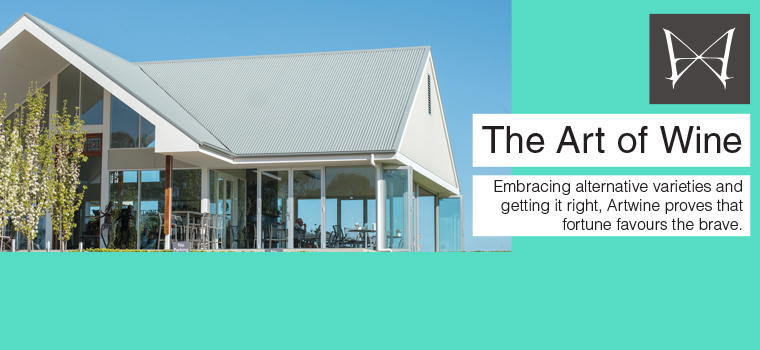Embracing alternative varieties and getting it right, Artwine proves that fortune favours the brave.
"While all the wines are made in commercial quantities, total production is only around the 10,000-case mark, and the Kellys are intent on remaining boutique in scale, which will enable them to retain their emphasis on fruit quality."
CHARLES GENT
HITCHING one’s star to alternative grape varieties was seen as a courageous move 13 years ago: for Artwine and its proprietors Glen and Judy Kelly, fortune has very much favoured the brave.
Artwine winery is based high in the Adelaide Hills east of the small town of Woodside, with the owners’ residence abutting a smart and stylish glass-walled cellar-door, all set in the midst of the home vineyards.
Glen, an erstwhile banker and market researcher and Judy, who formerly worked in corporate PR, had travelled extensively and were both firm fans of European varieties and styles, particularly in accompanying food. As Australian interest in the so-called alternative varieties from Spain, Italy and France began to acquire momentum, the Kellys made their own commitment. An initial purchase of vineyards in Clare was followed by the acquisition of the Adelaide Hills property. Judy remembers that when word of the Kellys varietal ambitions leaked out in Clare, there was more than a little local scepticism.
In the intervening years, they have embraced the cause with great gusto, as their list of current wines attests. It features, in addition to the now more familiar grapes of pinot gris/grigio, grenache and prosecco (both a pink and a white version), the varieties of pinot noir, albarino, tempranillo, fiano, graciano, gruner veltliner, montepulciano, viognier, arneis, sangovese, grenache gris, gamay and cabernet franc.
There has been some recent consolidation at Artwine – they recently parted with one of their two Clare vineyards – but if you think the brakes are being applied, think again.
“We’ve got two more varieties going in next year,” says Judy. “We’re putting in picpoul, and falanghina and additional gamay clones. At the moment we’ve got 13 varieties that we make 17 wines from, so we’ll have 17 varieties that we’ll probably make 21 wines from. That’s a lot.”
There’s upkeep too. The original plantings of tempranillo in Clare are currently being replaced with a new clone.
While all the wines are made in commercial quantities, total production is only around the 10,000-case mark, and the Kellys are intent on remaining boutique in scale, which will enable them to retain their emphasis on fruit quality.
“Our focus is very much on the vineyard,” Judy says. “If you haven’t got good fruit, you’re never going to get good wine, so we’ve put all our effort into the vineyards, and we’re very particular about the fruit. It’s minimal winemaking then; you don’t have to do that much.”
“The thing about the new Mediterranean varieties that we’re growing is that they are climatically suited. We’ve got the right ones in Clare, we’ve got the right ones here, we’ve got them facing the right way; it’s all climatically appropriate, which makes them more sustainable in the long term.”
Although intimately involved in the winemaking process, the Kellys have long standing arrangements with two contract winemakers.
The results have been impressive. In its comparatively short history, the Artwine range has achieved a remarkable record of success at wine shows and with critics. The 29 trophies to date include recent wins for their cabernet franc at the Clare Wine Show, as well as a trophy from the Australian Single Vineyard Wine Show for their grenache. They have also won 4 trophies from Winestate for their pinot grigio, gruner veltliner, montepulciano and fiano.
The course of viticulture never runs smooth. In the wake of the bushfires in late 2019, the entire crop of Artwine’s Hills vineyard was lost to smoke taint. The fire itself came within metres of the Kelly’s house, burning pinot noir vines and a garden hedge as well as a wood lot on the edge of the property. On balance, the Kellys who left their home “stupidly late” consider themselves to have been very lucky.
With only their Clare Valley vines producing in 2020, Glen and Judy got “a bit creative”, as she puts it. “We looked at what we had in barrel that we could do something with and made a sparkling montepulciano. We put it on at cellar door only, just a hundred dozen, to see what happened. Sold out. So, we made another one, and now we’re making a third.”
In another piece of winemaking whimsy, Artwine has produced what they believe to be the world’s only fortified fiano, which Judy has named ‘Yes Minister’, in slightly ironic tribute to her Welsh grandfather, who was a teetotal Presbyterian minister.
As if to compensate for 2020, the 2021 vintage has been spectacular right across the board, Judy Kelly says. “It was cool, it was a great summer, the vines were happy, we got a bit of rain. It was a perfect vintage.”
In addition to the ongoing bushfire threat, Artwine faces another nagging anxiety in the possible reanimation of a 19th century gold mine, its site only a few hundred metres from cellar door. The proposal, which has been strongly opposed by Artwine, their neighbours Bird in Hand and other local residents, is still pending.
Elegant and increasingly adventurous labels are another characteristic of Artwine, as are lively wine names. The newly released first vintage of their albarino is dubbed ‘The Real Thing’, a reference to the shemozzle around the initial importation of the grape that saw several vignerons plant the wrong variety. The Kellys narrowly avoided being caught up, but after a 10-year wait are now very happy to be producing authentic albarino.
In fact, you get a distinct sense that the Kellys are pretty happy, full stop.
“We just love this whole alternative thing: the wines are so exciting and so food-friendly.”

